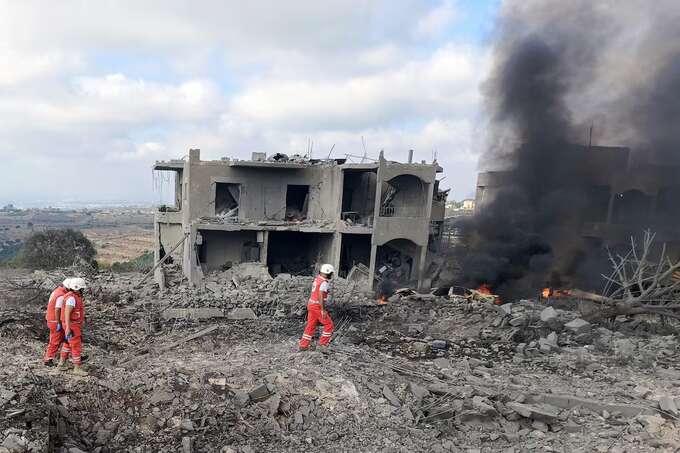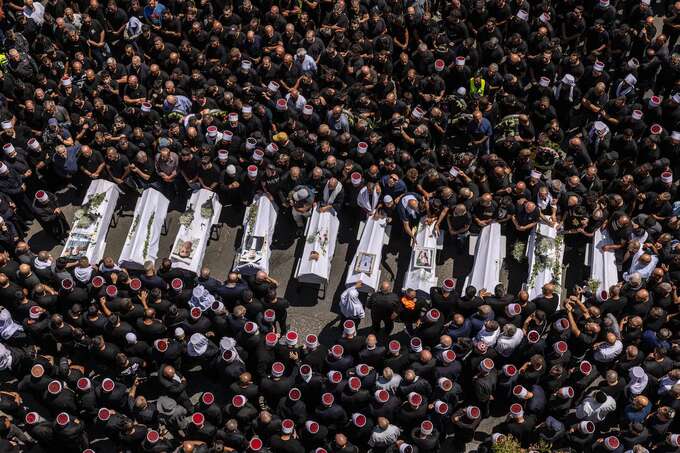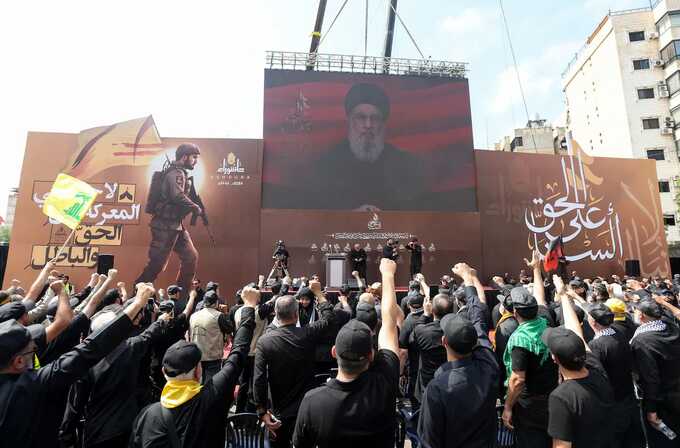As Israel wages its offensive against Hamas in Gaza, a near-constant volley of fire between Israel and Hezbollah on the border threatens to kick off another war, this one on Israel’s northern front? writes washingtonpost
What is Hezbollah, the militant group poised for war with Israel?
Israeli leaders have said they did not want to escalate the conflict with the Lebanese group. They also said they were ready for any scenario.
Here’s what to know about Hezbollah, a key player in the deepening tensions in the Middle East.
What is Hezbollah?
Hezbollah is a Shiite Muslim militant organization backed by Iran and based in Lebanon. In 1985, during the Lebanese civil war, the group published a manifesto that listed the destruction of Israel as a key goal, in response to its occupation of southern Lebanon.
Shiite Muslims, historically a minority group in Lebanon, make up roughly 32 percent of the country’s population. Hezbollah once could have been described as simply a proxy of Iran’s Shiite theocracy, but the group has won increasing popular support in Lebanon itself, especially as Shiite constituents feel marginalized and unsupported by the state.
Though Hezbollah and its allies lost their majority in Lebanon’s parliament in 2022, the group continues to wield significant influence. The United States classifies Hezbollah as a terrorist group and holds it responsible for the 1983 bombings of the U.S. Embassy and Marine barracks in Beirut, which killed roughly 300 American and French troops.
Why did Israel strike Beirut on Tuesday?
Over the weekend, Israel bombed a school-turned-shelter in Gaza and killed at least 30 Palestinians, according to local health authorities.
A rocket attack launched from Lebanon on Saturday killed at least a dozen people, all of whom were children and teenagers, in the Golan Heights. Israel attributed the attack — the deadliest the country has faced since Oct. 7 — to Hezbollah, though the organization was quick to deny any involvement.
In response, Israel hit Hezbollah targets deep inside Lebanon on Sunday. On Tuesday, the Israeli military carried out an airstrike in a densely packed neighborhood on the outskirts of Beirut that killed Fuad Shukr, a senior Hezbollah commander alleged to have been behind the Golan Heights attack.
Shukr had been wanted by the United States for purportedly playing “a central role” in the 1983 Beirut bombings.

Members of the Lebanese Red Cross walk toward a burning vehicle after an Israeli air raid on the town of Shamaa in southern Lebanon on Thursday. (Kawnat Haju/AFP/Getty Images)
Is another war brewing on the Lebanon-Israel border?
Israel shares its northern border with southern Lebanon. Strikes between Hezbollah and Israel have been commonplace for decades, but the recent escalation could push Israel to wage war on two fronts: in Gaza against Hamas and in Lebanon against Hezbollah.
On Oct. 8, a day after a cross-border Hamas attack sparked an ongoing Israeli military campaign that has killed tens of thousands of Palestinians, Hezbollah said it attacked Israeli targets in Shebaa Farms, a disputed area on the border. Israel and the militant group traded fire in the days that followed, and such attacks have forayed deeper and deeper into both Lebanon and Israel in the nearly 10 months since.
As Israel and Hezbollah trader fire, peacekeepers from the United Nations said they were working to negotiate with both parties to defuse a “very dangerous situation.” On Nov. 2, Hezbollah said it had struck 19 targets in Israel.
During a visit to the northern border last month, Israeli Prime Minister Benjamin Netanyahu said his nation was “prepared for a very intense operation,” and Defense Minister Yoav Gallant threatened to take Lebanon “back to the Stone Age.” Hezbollah maintained that it would not relent until a cease-fire was reached in the Gaza Strip.

Thousands of people from the Druze community attend the funeral of 12 children and teenagers killed in a rocket attack from Lebanon in the Israeli-occupied Golan Heights, on Sunday. (Heidi Levine for The Washington Post)
In a visit Monday to the Golan Heights — the site of the deadly Saturday strike from Lebanon — Netanyahu said Israel “will not, and cannot, ignore this,” before vowing: “Our response will come, and it will be severe.”
International officials have tried to use diplomacy to prevent another war. Defense Secretary Lloyd Austin said Tuesday that Washington will defend Israel in the event of a Hezbollah attack, though he still voiced hope for a diplomatic solution.
The Israeli army is battered by almost 10 months of bloody battle against Hamas. Hezbollah presents a larger, more strategic and better-armed foe, and there are concerns about whether Israel has the resources and stamina to wage another full-scale offensive.
A war with Israel would also be costly for Hezbollah and Lebanon, both in terms of the likely casualty count and the risk to Hezbollah of losing its political influence in Lebanon.
Lebanon has been bracing for a full-blown war since the strike on the Golan Heights. Hezbollah militants threatened to target Haifa and other Israeli cities if Beirut was hit — which happened Tuesday.
The growing conflict could reverberate throughout the Middle East, with Turkish President Recep Tayyip Erdogan hinting that his country could “enter” Israel if the situation called for it.
Air France, Lufthansa and Turkish Airlines were among carriers that canceled flights to Beirut this week, and the list of countries with advisories cautioning their citizens against visiting Lebanon continues to grow.
How is Hezbollah related to Hamas and the Houthis?
Hamas took control of the Gaza Strip in 2006 and is committed to eliminating Israel and establishing an Arab Palestinian state.
Hezbollah and Hamas have taken opposite stances on the Syrian civil war, with Hezbollah supporting dictator Bashar al-Assad, who practices a branch of Shiite Islam; Hamas is a Sunni movement.
However, their shared opposition to Israel’s existence has brought the two groups closer together.
Hezbollah has also trained Yemen’s Shiite Houthi rebels as well as militias in Iraq. Last month, Israel intercepted a missile from Yemen after the Israeli military struck a Houthi-controlled port there in response to a rare Houthi attack on Tel Aviv the day before.
Iran’s Shiite theocracy backs all three groups.
Hamas has denied any involvement from Iran and Hezbollah in planning the Oct. 7 attack on Israel. Iran has also denied any role in the attack, though some analysts say it is likely that Hezbollah and Iran provided Hamas planning advice.
Hezbollah said its Oct. 8 attacks on the disputed Shebaa Farms area were launched “in solidarity” with Hamas, and at a rally in Beirut, a Hezbollah leader expressed further support: “Our hearts are with you. Our history and guns and our rockets are with you.”
Read more similar news:
Comments:
comments powered by Disqus


































